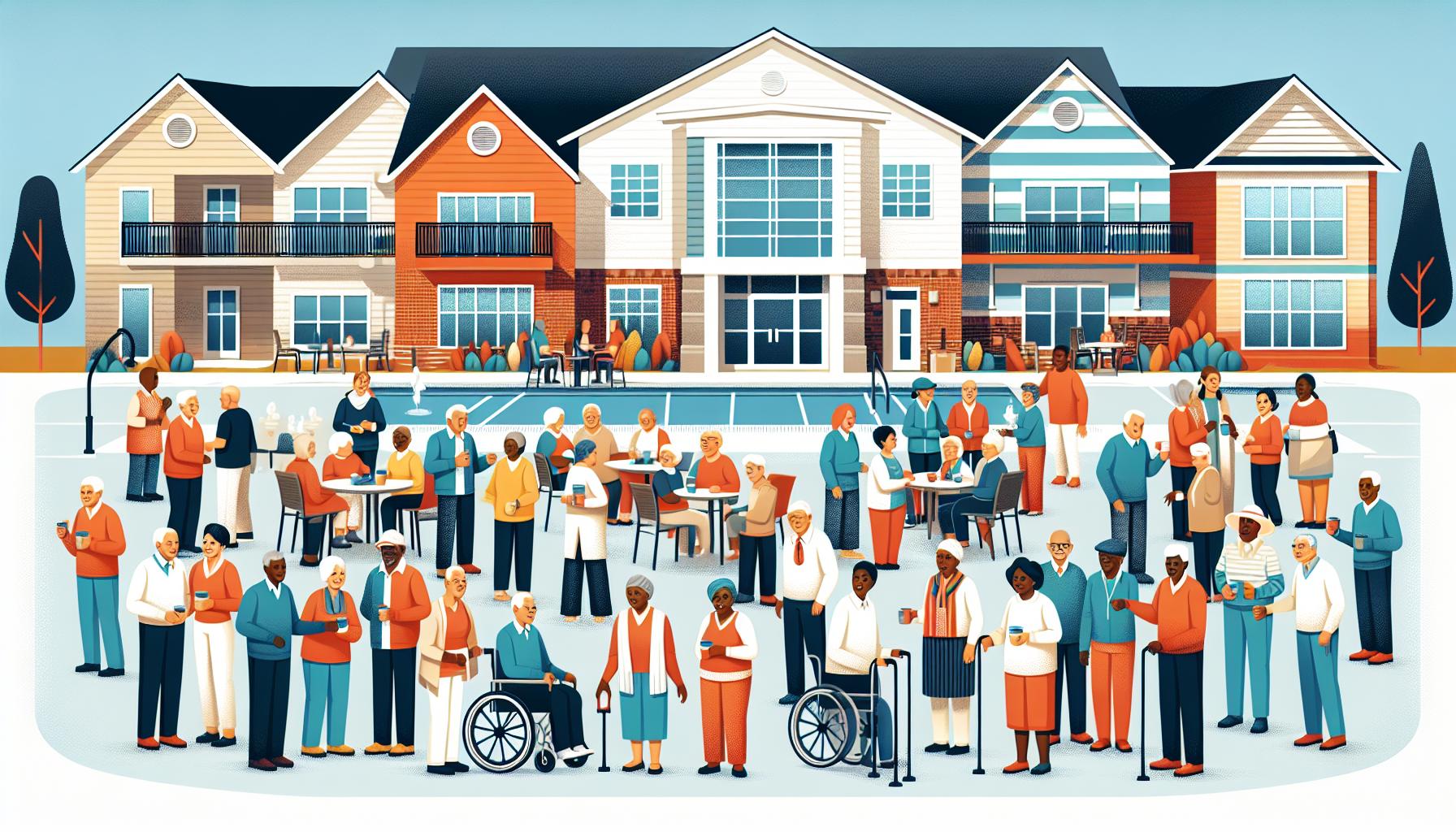Key Takeaways
- Senior housing property management focuses on balancing resident well-being with operational efficiency, prioritizing safety, comfort, and accessibility.
- Addressing the unique needs of senior residents, such as mobility assistance and social engagement, fosters trust and creates a thriving community.
- Effective property maintenance, routine safety inspections, and compliance with accessibility standards are essential for preserving property value.
- Strong financial oversight, including budgeting and emergency planning, ensures economic sustainability and uninterrupted operations.
- Building a skilled, compassionate staff with proper training enhances resident satisfaction and improves day-to-day management.
- Overcoming challenges like aging infrastructure, staff retention, and diverse resident expectations requires proactive planning and personalized solutions.
Managing senior housing properties comes with its own set of responsibilities and rewards. It’s about creating a safe, comfortable, and well-maintained environment where residents can truly feel at home. But how do you balance meeting the needs of tenants while keeping the property in excellent condition?
Whether you’re an investor or a landlord, overseeing senior housing requires thoughtful planning and consistent care. From regular inspections to addressing tenant concerns, every decision impacts both the residents’ quality of life and the property’s long-term value. Are you prepared to meet these challenges head-on?
By understanding the specific needs of senior living spaces, you can build trust with tenants and foster a community that thrives. It’s not just about managing a property—it’s about making a difference for those who call it home.
Overview Of Senior Housing Property Management
Managing senior housing properties involves addressing both operational needs and the well-being of residents. These properties require a thoughtful approach to create a living environment that promotes safety, comfort, and accessibility for seniors. At the same time, sound property management practices help maintain and even enhance the investment’s value.
Operational tasks include routine maintenance, compliance with accessibility standards, and regular safety inspections. These steps help prevent potential problems while keeping the property functional and secure. Communication with residents also plays a critical role, addressing their concerns promptly and fostering trust within the community.
Understanding the specific needs of seniors is essential. Many residents may require mobility aids or specific living accommodations. Maintaining open communication channels makes addressing individual needs feasible, whether they relate to facility improvements or personal support. How can property managers better connect with residents to anticipate and fulfill these needs effectively?
Financial oversight is another vital element. Proper budgeting, expense tracking, and rental income management contribute to the property’s economic sustainability. By maintaining transparency with owners and stakeholders, it’s easier to make informed decisions that benefit everyone involved.
Staff coordination is key. Building a reliable team that’s experienced in senior living care helps create a supportive environment. Training staff to handle health emergencies and day-to-day challenges builds confidence and ensures residents feel well cared for. How can teams improve their responsiveness and adaptability to senior residents’ evolving needs?
Senior housing property management requires combining practical solutions with compassion. A structured yet flexible approach allows managers to support residents while maintaining operational excellence.
Key Responsibilities Of Senior Housing Property Managers

Senior housing property managers balance resident well-being with efficient operations. These roles focus on safety, upkeep, and team coordination to maintain a nurturing community.
Ensuring Safety And Compliance
Safety measures and regulatory compliance are priorities in senior housing. I conduct regular safety checks to identify potential hazards like slippery surfaces or faulty equipment. Emergency response plans, including fire and evacuation protocols, are updated consistently to address risks.
Compliance with local housing and health codes is crucial. I verify that the property meets accessibility standards, such as ADA requirements, to accommodate residents with mobility challenges. By staying informed about regulations, I help avoid legal or safety infractions.
Managing Maintenance And Upkeep
Regular maintenance preserves the property’s functionality and residents’ comfort. My team handles routine tasks like HVAC servicing, plumbing repairs, and lawn care. Preventative maintenance schedules reduce the likelihood of equipment failures.
I respond promptly to repair requests from residents. For example, fixing broken elevators or addressing heating issues during colder months increases their quality of life. Long-term projects, such as roof replacements, are planned during budget reviews to distribute costs efficiently.
Overseeing Staff And Operations
Strong management fosters a supportive, well-run environment for residents and employees. I coordinate staffing schedules to maintain consistent coverage and handle hiring for roles like caregivers, cleaning staff, and administrators.
Team training equips employees with skills for handling senior-specific care. I facilitate workshops on topics like emergency protocols and effective communication with residents. Open communication between staff and management minimizes misunderstandings and reinforces a collaborative atmosphere.
Important Factors To Consider In Senior Housing Property Management

Effective senior housing property management prioritizes residents’ comfort and property sustainability. Balancing resident needs, financial planning, and legal requirements is critical to creating a thriving community.
Understanding Resident Needs
Resident needs shape the foundation of senior housing management. I focus on fostering a safe, comfortable environment while addressing specific concerns such as mobility assistance and access to amenities. Personalizing services supports their daily living and well-being.
Open communication is essential for understanding preferences. For example, I regularly gather feedback on meal options, community activities, and facility features to identify areas needing improvement. How can feedback be better incorporated into daily operations to refine the resident experience?
Budgeting And Financial Planning
Comprehensive financial planning supports operational functionality. Careful tracking of income and expenses allows me to allocate resources effectively, ensuring maintenance, staffing, and services stay consistent.
I develop budgets that include provisions for unexpected repairs, ongoing maintenance, and capital improvements. For instance, setting aside 10%-15% of annual revenue for emergency funds minimizes disruptions during unforeseen situations. What strategies might strengthen your property’s financial stability?
Legal And Regulatory Requirements
Compliance with local housing and safety regulations safeguards residents and protects property value. Following laws related to accessibility, fire safety, and health standards is non-negotiable in senior housing.
I stay updated on changes in legal requirements to remain compliant. For example, adhering to ADA standards for accessible building entrances and elevators eliminates barriers for residents with mobility challenges. How can regulatory awareness become part of everyday operations to avoid potential risks?
Benefits Of Effective Senior Housing Property Management

Effective senior housing property management balances resident well-being with operational efficiency. It fosters an environment of trust and comfort while maintaining the property’s economic and physical appeal.
Enhanced Resident Satisfaction
Keeping residents satisfied involves addressing their unique needs promptly. Regular maintenance, like fixing heating issues or installing mobility aids, contributes directly to their comfort. Open communication channels allow residents to express concerns or suggest improvements, creating a sense of inclusion.
Do you prioritize emotional and social well-being? Organizing activities such as group exercises, hobby clubs, or seasonal events helps cultivate a community feel. When residents feel valued and connected, their overall happiness improves.
Improved Property Value
Maintaining high property standards safeguards its long-term worth. Performing regular inspections helps identify potential issues before they escalate. For example, repairing small leaks or updating outdated safety features can prevent expensive damage.
Do you focus on visual appeal? Landscaping, fresh paint, and modernized fixtures not only enhance aesthetics but attract new residents. Properties with consistent upkeep typically retain higher valuation in a competitive market.
Streamlined Day-To-Day Operations
Strong management structures simplify daily tasks. Clear staff roles and training improve efficiency while reducing errors. For instance, properly trained maintenance teams can fix minor repairs faster, minimizing disruptions.
Would operations run more seamlessly with routine protocols? Scheduling inspections, preventive maintenance, and detailed record-keeping avoids last-minute emergencies. Consistent practices alleviate stress for both staff and residents while boosting overall satisfaction.
Challenges In Senior Housing Property Management

Managing senior housing properties comes with specific challenges that demand thoughtful strategies to create a safe and thriving environment for residents. Each difficulty presents an opportunity to enhance operations and address both resident needs and property requirements effectively.
Addressing Aging Infrastructure
Aging properties can develop issues like outdated plumbing, electrical systems, or structural wear. Renovations and upgrades play a critical role in maintaining safety and functional living spaces. I’ve found that prioritizing regular inspections helps identify areas needing improvement before they escalate into costly repairs. How often are infrastructure assessments conducted on your properties? Staying proactive reduces risks and preserves the property’s value.
Compliance adds another layer. Older buildings often require modifications to meet current accessibility standards. Adding wheelchair ramps, installing elevators, and upgrading units for mobility needs are essential considerations. Investing in these updates supports residents while adhering to legal regulations.
Staff Retention And Training
Employee turnover in senior housing can disrupt operations and impact resident relationships. Retaining skilled staff is vital for continuity and maintaining a stable environment. Competitive wages, clear career development opportunities, and a positive work culture can improve retention rates. Are steps in place to create a workplace staff want to stay in long-term?
I focus on consistent training to empower team members in their roles. For example, training on communication, first aid, and resident care ensures staff can handle everyday responsibilities confidently. These programs build stronger teams while improving overall service quality.
Meeting Diverse Resident Expectations
Residents in senior housing often have varied needs, from dietary preferences to medical care. Balancing these expectations requires personalized approaches. I take the time to understand individual preferences through regular feedback, which helps identify gaps in services. What strategies are currently in use to engage residents and gather their input?
Organizing activities and community events tailored to different interests fosters a sense of inclusion. Some residents may prefer social gatherings, while others value quieter, personal interaction. Providing opportunities for both keeps everyone engaged and satisfied.
Challenges in senior housing property management require a thoughtful approach, balancing operational demands with compassionate care. Each challenge presented is an opportunity to refine practices and create positive, lasting impacts for staff, residents, and the property itself.
Choosing The Right Senior Housing Property Management Team

Finding the right team for senior housing property management involves evaluating skills, experience, and compatibility with residents’ needs. A thoughtful selection approach helps build an environment that supports well-being and operational efficiency.
Key Qualities To Look For
Strong communication skills help management teams address resident concerns effectively. Teams that listen actively and respond promptly create trust and foster a positive atmosphere. Experienced managers understand age-specific needs, including mobility challenges, social engagement, and access to healthcare resources.
Attention to detail is critical for maintaining compliance with safety standards and accessibility requirements. Skilled teams handle regular inspections and swiftly resolve maintenance issues. Financial expertise ensures that budgeting and expense tracking prioritize sustainability and resident comfort. Lastly, compassion and patience are vital for interacting with residents, families, and staff in a caring and respectful manner.
Questions To Ask During Selection
What strategies do you use to understand and meet the residents’ needs? Responses provide insight into their approach to improving quality of life. How does the team handle emergencies or safety concerns? This highlights preparedness and commitment to resident well-being.
How do you track maintenance progress or ensure timely repairs? Asking this reveals their attention to operational efficiency. How do you manage finances, including budgets and unforeseen expenses? Financial management is crucial for operational success. How do you train staff or encourage professional development? Training practices reflect the team’s dedication to maintaining a skilled and motivated workforce.
Conclusion
Managing senior housing properties requires a thoughtful balance of compassion, efficiency, and strategic planning. It’s about more than maintaining buildings—it’s about creating a safe, welcoming environment where residents feel valued and cared for. By prioritizing safety, compliance, and personalized services, property managers can foster trust and enhance residents’ quality of life.
The challenges in this field offer opportunities to innovate and improve, ensuring both operational success and resident satisfaction. With the right team, clear communication, and a proactive approach, senior housing properties can thrive as vibrant communities that meet the unique needs of their residents.
Frequently Asked Questions
What are the key responsibilities of senior housing property managers?
Senior housing property managers are responsible for ensuring resident safety and comfort, maintaining the property, complying with legal and accessibility standards, managing finances, and coordinating staff. Their role balances resident well-being with operational efficiency, prioritizing regular maintenance, safety inspections, and open communication to meet resident needs effectively.
Why is regular maintenance important in senior housing?
Regular maintenance ensures the property remains safe, functional, and comfortable for residents. It includes addressing repair requests promptly, conducting inspections, and planning long-term improvements. Proper maintenance not only enhances residents’ quality of life but also preserves the property’s value over time.
How can property managers ensure accessibility in senior housing?
Property managers ensure accessibility by complying with local regulations, making mobility accommodations like ramps or elevators, and conducting regular inspections to uphold accessibility standards. Consistent updates and proactive adjustments help meet the diverse needs of residents with mobility challenges.
Why is communication vital in senior housing management?
Effective communication fosters trust between property managers and residents. Open dialogue allows managers to gather feedback, address concerns, and personalize services. Clear communication also helps residents understand safety protocols and community updates, enhancing their overall experience.
How do senior housing property managers handle financial planning?
Financial planning involves creating budgets, tracking expenses, and allocating funds for regular maintenance and emergency needs. Senior housing managers focus on economic sustainability through careful planning, ensuring the property operates efficiently while maintaining high standards for residents.
What are some challenges in managing senior housing properties?
Common challenges include aging infrastructure, staff retention, meeting diverse resident needs, and ensuring compliance with safety and accessibility standards. Property managers address these issues through proactive inspections, renovations, consistent training, and personalized approaches for resident care.
How can activities and events improve resident satisfaction?
Organizing tailored activities and community events boosts engagement and fosters a sense of belonging among residents. These initiatives promote social interaction, improve mental well-being, and create a positive living environment, contributing to overall resident happiness.
What should you look for in a senior housing property management team?
An ideal team should have strong communication skills, attention to detail for compliance, financial expertise, and compassion for residents. Evaluating their experience, strategies for handling emergencies, and ability to meet resident needs ensures a good fit for the property.
How can staff retention improve senior housing management?
Retaining skilled staff ensures continuity and high-quality service. Competitive wages, consistent training, and a supportive work environment help reduce turnover, enhancing the overall care and experience for both residents and employees.
Why is compliance with legal and safety regulations important?
Compliance ensures the safety and well-being of residents while protecting the property’s reputation and value. Regular updates to meet local housing codes, accessibility standards, and emergency response plans minimize risks and maintain a secure environment.
